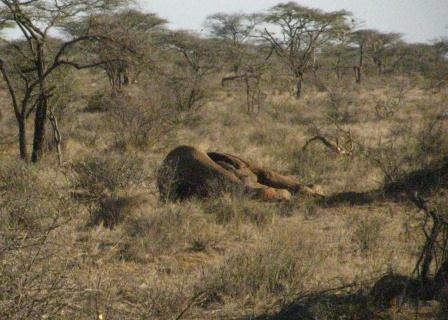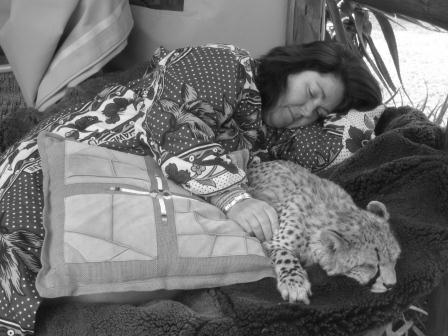
Elephant in Samburu, gravely injured by poachers and eventually shot by KWS. A pride of lions feasted on the carcass for days. Photo by K Colson
Corwin and I do a morning game drive in Samburu – not as exciting as the night before – but we are still rewarded with the extraordinary sight of another leopard. As we drive out of the park, Kura and I take David and Corwin past the dead elephant that we had seen the night before. Wounded by poachers, the elephant had made its way to the safety of the park, but it was gravely injured and a few days ago the Kenya Wildlife Service had shot it and removed its tusks. A pride of lions had been feasting on the carcass for a couple of days but when we finally come upon the elephant the lions had departed, giving the vultures and storks a turn. The carcass is a grim reminder of the rising death toll of African elephants and rhinos, sacrificed to the arrogant demands for ivory and rhino horn from the Middle East and Asia.Tonight we will be at Kongoni Camp – a modest property on the outskirts of Nanyuki town. This will be our last night with David and Corwin and we will be joined by some of my safari company partners and their spouses. I have booked the thatched rondavels at Kongoni for David and Corwin, and also for myself. But tonight I will not be alone.As we come into Nanyuki, I decide to forgo picking up my other bags and clean clothes at the BOMA house. Instead we go straight to Kongoni. As I walk into the restaurant to check us in I realize that I must look a mess. I don’t have a stitch of clean western clothing left – everything I own is caked in dust and sweat. My safari hat is now a permanent fixture on my head. My backpack is weighted down with a laptop, notebooks, water bottles and a first aid kit.“Hello, Bwana,” I say to my husband as I walk into the room. Doug is seated at a table with the Kenyan newspapers in front of him. He looks at me and smiles. “I’m sorry, I look a mess,” I tell him. “You look great, Mama Rungu,” as he sweeps me up in a big hug and kiss. A part of my fierce guard, maintained over the past two weeks, starts to fall. Kura does a great job of managing the conditions in northern Kenya for all of us, but more and more, as we grow and bring more people to the north, we are starting to share that burden. Keeping everyone safe and healthy, from our BOMA team to our visitors, is a 24 hour responsibility. Now someone is here to take care of me for a few days.The night is a wonderful mix of Kenyans and Americans. Omar, Semeji and Maina are dressed “smart”, as they say in Kenya. Kura’s smile is as big as the house, and it beams under the brim of a big red baseball cap. Big William of Baisy Oryx Safaris, is here with his city wife, Agnes (the country wife maintains the farm in Nyahuruhuru); Edward brings his wife Octavia who promptly invites me to stay at their nearby farm. Eutychus, my daily safari company contact, is here alone – his wife is still at home with their new baby. We enjoy drinks and snacks by the roaring fire and then 19 of us sit at a long table upstairs. In a toast to everyone who has contributed so much to BOMA’s success, including the Baisy team who have been so generous with their time and donations, I also welcome David and Corwin to the extended BOMA family. For their kindness of heart and sensitive generosity, they will be a part of us forever.For the next few days, Doug and I take a break with 3 nights of safari life at Sirikoi Camp set on the Lewa Conservancy. We check into a beautiful tent with a view of a waterhole. Just a few hundred yards from our tent a pair of elephants and a pair rhinos graze. The most marvelous attraction of the whole visit was the presence of a new camp resident, an orphaned baby cheetah. At four months old, Sheba is surprisingly big and she does not hesitate to take your hand in her powerful paws and mouth, encouraging you to continue to pet her.
One morning as I was drawing a bath after a long game drive, I noticed Sheba walking by the tent. I patted on the cushion of the large chair on my porch and she stopped, sat on her haunches and looked at me. I kept patting the cushion and she walked closer, eventually climbing up on the deck and settling into the chair. I petted her long back and rough patch of hair at the nape of her neck. She growled. Actually, it was a purr, but it was so deep and powerful that it surprised me. This was still a wild animal. I couldn’t resist. I climbed up on the chair with Sheba, cuddled her on the chair and closed my eyes. And that is how I took a nap with a cheetah.

